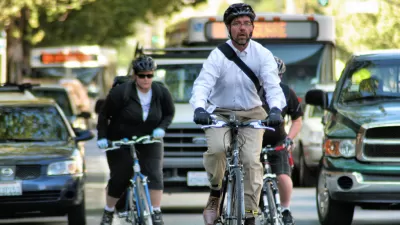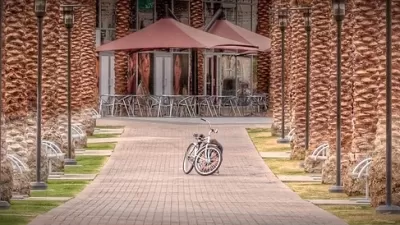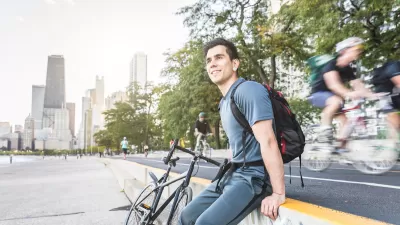Walk Score released an updated ranking of the best cities for biking—including Bike Scores for a total of 154 U.S. cities—in time for Bike to Work Week and National Bike Month.

"Minneapolis is the most bikeable city in the U.S., according to the latest ranking by Walk Score," reports a post on Redfin by Rachel Musiker (Walk Score is a Redfin company). Musiker adds: "With a Bike Score of 81.3, Minneapolis has a strong lead over San Francisco (75.1) and Portland (72.0)."
Walk Score updated the Bike Score rankings to commemorate Bike to Work Week and National Bike Month, which concluded on May 15. The rankings mentioned above are for cities with a population of greater 300,000. Several college towns, led by Cambridge, Massachusetts and Davis, California, actually have higher Bike Scores. Walk Score now provides Bike Scores for 154 cities in total.
The post includes several angles of insight into the rankings, including a point about infrastructure.
"Thanks to investments in infrastructure such as protected bike lanes and networks of bike paths, several cities saw big increases in their Bike Scores since the 2013 ranking. On average, cities that ranked in the top 20 saw an increase of more than two Bike Score points. Chicago’s Bike Score increased by almost nine full points, from 61.5 in 2013 to 70.2 today. In the past two years, the Chicago Department of Transportation has launched and grown the Divvy bike share system and expanded its on-street bike network to include more than 225 miles of bike lanes and routes. Expect the city’s score to climb in the next five years as Mayor Emanuel’s Chicago Streets for Cycling Plan 2020 includes completion of a 645-mile network of on-street bikeways by 2020."
FULL STORY: Minneapolis Tops San Francisco, Portland as Most Bikeable City of 2015

Planetizen Federal Action Tracker
A weekly monitor of how Trump’s orders and actions are impacting planners and planning in America.

Maui's Vacation Rental Debate Turns Ugly
Verbal attacks, misinformation campaigns and fistfights plague a high-stakes debate to convert thousands of vacation rentals into long-term housing.

San Francisco Suspends Traffic Calming Amidst Record Deaths
Citing “a challenging fiscal landscape,” the city will cease the program on the heels of 42 traffic deaths, including 24 pedestrians.

Amtrak Rolls Out New Orleans to Alabama “Mardi Gras” Train
The new service will operate morning and evening departures between Mobile and New Orleans.

The Subversive Car-Free Guide to Trump's Great American Road Trip
Car-free ways to access Chicagoland’s best tourist attractions.

San Antonio and Austin are Fusing Into one Massive Megaregion
The region spanning the two central Texas cities is growing fast, posing challenges for local infrastructure and water supplies.
Urban Design for Planners 1: Software Tools
This six-course series explores essential urban design concepts using open source software and equips planners with the tools they need to participate fully in the urban design process.
Planning for Universal Design
Learn the tools for implementing Universal Design in planning regulations.
Heyer Gruel & Associates PA
JM Goldson LLC
Custer County Colorado
City of Camden Redevelopment Agency
City of Astoria
Transportation Research & Education Center (TREC) at Portland State University
Jefferson Parish Government
Camden Redevelopment Agency
City of Claremont




























